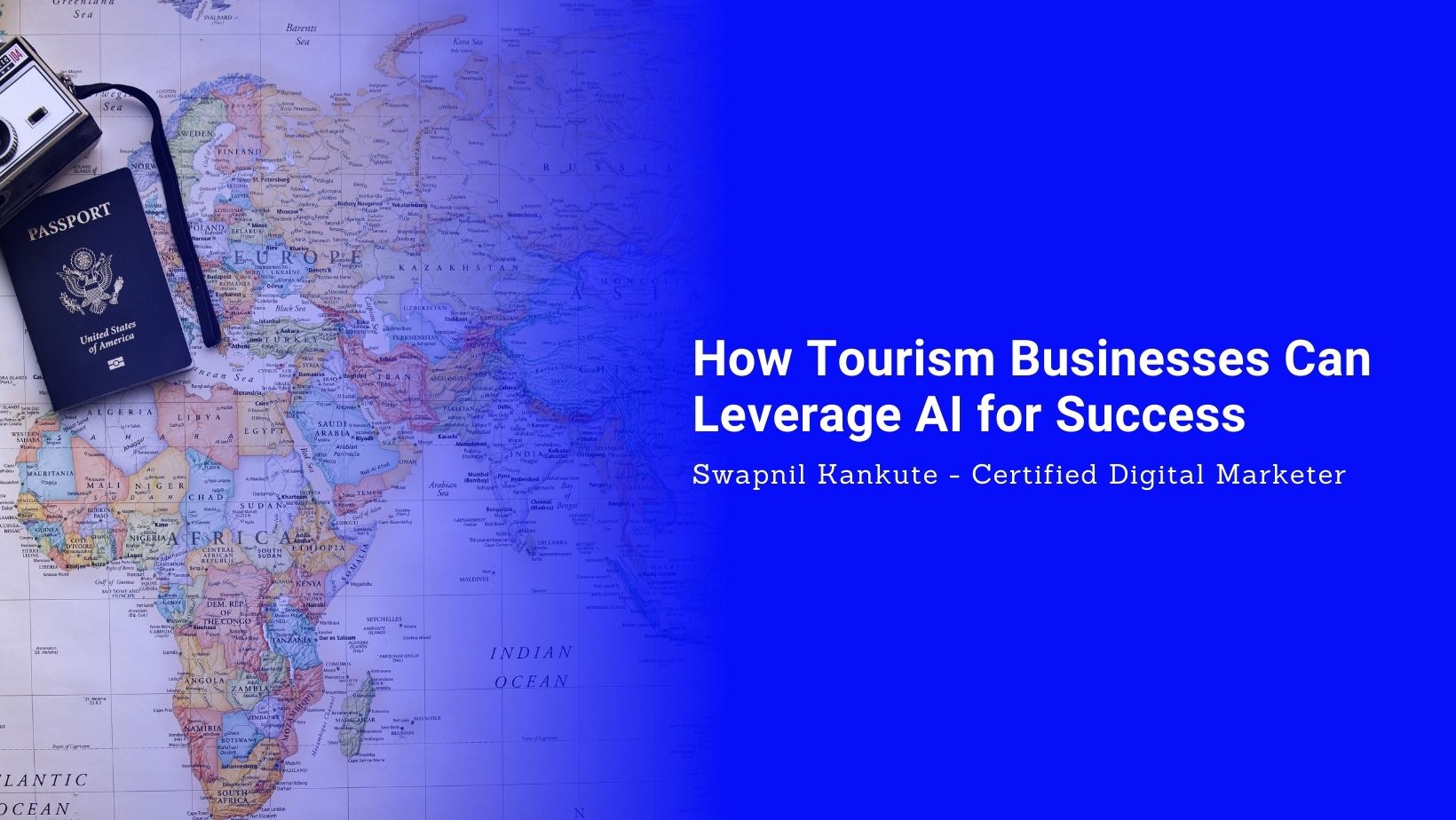I am Swapnil Kankute, Certified Digital Marketer. Artificial Intelligence (AI) is transforming various industries, and the tourism sector is no exception. For tourism businesses, AI offers a myriad of opportunities to enhance operational efficiency, improve customer experience, and drive profitability. Here’s how tourism businesses can leverage AI for success.
Table of Contents
ToggleUnderstanding AI in the Tourism Industry
How does AI help in the tourism industry? AI helps the tourism industry by providing personalized experiences, optimizing resource management, enhancing customer insights, streamlining operations, and improving marketing strategies. It enables businesses to deliver better services and make data-driven decisions that increase efficiency and customer satisfaction.
1. Personalized Customer Experiences
One of the significant benefits of AI is its ability to provide personalized experiences for customers. AI algorithms analyze data from previous customer interactions, preferences, and behaviors to create customized travel recommendations. For instance:
- Chatbots and Virtual Assistants: AI-powered chatbots and virtual assistants can handle customer inquiries 24/7, provide personalized recommendations, and assist with bookings. They enhance customer service by offering instant responses and tailored suggestions.
- Personalized Marketing: AI can analyze customer data to segment audiences and create targeted marketing campaigns. This ensures that promotions and offers are relevant to each customer, increasing the chances of conversion.
2. Efficient Resource Management
AI can help tourism businesses optimize resource management by predicting demand and identifying peak periods for bookings. By leveraging AI technologies, businesses can allocate resources more effectively and manage demand more efficiently. For example:
- Dynamic Pricing: AI can adjust prices in real-time based on demand, competition, and other market factors. This ensures that pricing strategies maximize revenue and occupancy rates.
- Inventory Management: AI systems can forecast demand for various services such as flights, hotel rooms, and car rentals. This helps businesses manage their inventory better, avoiding overbooking or underbooking.
3. Enhanced Customer Insights
AI provides valuable insights into customer behavior and preferences through data analysis. By understanding customer needs, tourism businesses can tailor their offerings to meet expectations and enhance satisfaction. Key applications include:
- Sentiment Analysis: AI can analyze customer reviews and feedback to gauge sentiment and identify areas for improvement. This helps businesses address issues proactively and enhance their service quality.
- Behavioral Analysis: By analyzing browsing and purchasing behavior, AI can identify trends and preferences. This information can be used to tailor marketing strategies and improve product offerings.
4. Streamlined Operations
AI can automate routine tasks and streamline operations, allowing tourism businesses to focus on strategic activities. Automation leads to increased efficiency and cost savings. Some examples include:
- Automated Booking Systems: AI-powered systems can handle bookings, cancellations, and modifications automatically. This reduces the workload on human staff and minimizes errors.
- Predictive Maintenance: For businesses with physical assets like hotels or transport services, AI can predict maintenance needs and schedule timely repairs. This prevents downtime and ensures smooth operations.
5. Enhanced Marketing and Sales Strategies
AI can revolutionize marketing and sales strategies by providing deeper insights and enabling more effective campaigns. Key benefits include:
- Customer Segmentation: AI can segment customers based on various criteria such as demographics, behavior, and preferences. This allows businesses to target specific groups with tailored messages.
- Predictive Analytics: AI can predict future trends and customer behavior, helping businesses plan their marketing strategies accordingly. This leads to more effective campaigns and higher conversion rates.
6. Improved Customer Support
AI-powered customer support tools can significantly enhance the customer experience by providing timely and accurate assistance. Examples include:
- AI Chatbots: Chatbots can handle a large volume of inquiries simultaneously, providing quick and accurate responses. They can assist with common queries, booking issues, and general information.
- Voice Assistants: AI-driven voice assistants can interact with customers through voice commands, offering a more personalized and convenient service.
Leveraging AI in Your Tourism Business
How businesses can leverage AI? To leverage AI, tourism businesses should focus on integrating AI technologies into their operations, from customer service to marketing and resource management. This includes adopting AI-powered tools like chatbots, virtual assistants, and predictive analytics systems.
How to use AI for travel business? To use AI in a travel business, companies can start by implementing AI chatbots for customer service, using AI for personalized marketing campaigns, optimizing pricing strategies with dynamic pricing models, and employing AI for efficient inventory management.
AI Adoption in the Travel Industry
What travel companies are using AI? Many leading travel companies are using AI to enhance their operations and customer experiences. Examples include:
- Expedia: Uses AI to provide personalized travel recommendations and improve customer service through chatbots.
- Hilton Hotels: Employs AI-driven chatbots and virtual assistants to handle guest inquiries and bookings.
- KLM Royal Dutch Airlines: Utilizes AI for social media customer service and to provide real-time flight information.
- Booking.com: Leverages AI to offer personalized travel suggestions and optimize pricing strategies.
Conclusion
AI offers numerous benefits for tourism businesses, from personalized customer experiences and efficient resource management to enhanced customer insights and streamlined operations. By leveraging AI technologies, tourism businesses can maximize their operational efficiency, resulting in improved performance and increased profitability. Embracing AI is not just a trend but a strategic move towards sustained success in the competitive tourism industry.



